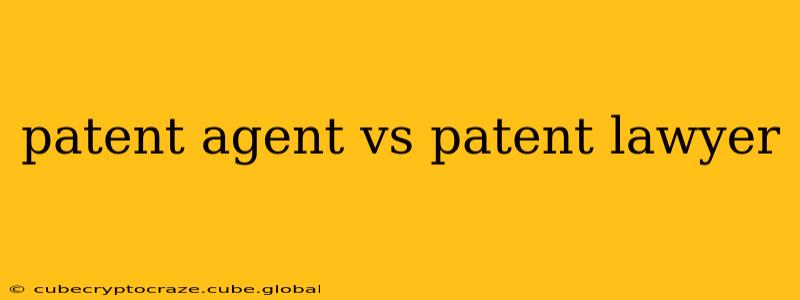Choosing the right legal professional to handle your patent application can be crucial to its success. But what's the difference between a patent agent and a patent lawyer? Both are qualified to help you navigate the complex world of patents, but their qualifications and permissible activities differ significantly. This guide will clarify the distinctions to help you make an informed decision.
What is a Patent Agent?
A patent agent is a specialist in patent law who has passed a rigorous examination administered by the United States Patent and Trademark Office (USPTO). They possess deep technical expertise and are highly skilled in drafting and prosecuting patent applications. However, unlike patent lawyers, they cannot represent clients in court. Their role primarily focuses on the technical aspects of patent prosecution before the USPTO.
Key Responsibilities of a Patent Agent:
- Patent Application Drafting: They meticulously draft patent applications, ensuring they meet the USPTO's stringent requirements for clarity, completeness, and compliance.
- Patent Prosecution: They manage the application process, responding to office actions (rejections or objections from the USPTO examiner), and arguing for the allowance of the patent.
- Patent Searches: They conduct thorough prior art searches to determine the patentability of an invention.
- Client Consultation: They advise clients on the strategic aspects of patent protection, such as claim scope and patentability.
What is a Patent Lawyer?
A patent lawyer is a licensed attorney who also possesses expertise in patent law. They've completed law school, passed the bar exam, and often have additional training and experience in intellectual property (IP) law. This qualification gives them broader legal authority than a patent agent.
Key Responsibilities of a Patent Lawyer:
- All the responsibilities of a patent agent: Patent lawyers can perform all the tasks a patent agent can.
- Litigation: They can represent clients in court in cases involving patent infringement or other IP disputes.
- Licensing and Agreements: They can negotiate and draft contracts related to patent licensing and technology transfer.
- IP Strategy: They offer comprehensive IP advice, including strategies for protecting and enforcing intellectual property rights.
Patent Agent vs. Patent Lawyer: Which One Do I Need?
The choice between a patent agent and a patent lawyer depends largely on your specific needs.
-
If you only need help with the patent application process before the USPTO, a patent agent is often sufficient and may be a more cost-effective choice. They are deeply knowledgeable about the technical intricacies of patent prosecution.
-
If you anticipate the need for litigation or other legal representation beyond the USPTO, you'll need a patent lawyer. Their broader legal capabilities provide essential support for resolving disputes and managing broader IP strategies.
-
If you need a comprehensive IP strategy encompassing both patent prosecution and potential litigation, a patent lawyer is generally recommended.
How Much Does Each Cost?
The cost of hiring either a patent agent or a patent lawyer varies considerably, depending on factors like the complexity of the invention, the amount of work involved, and the attorney's hourly rate. Expect to pay a significant amount, regardless of your choice.
Can a Patent Agent Become a Patent Lawyer?
Yes, a patent agent can become a patent lawyer by completing law school, passing the bar exam, and gaining relevant experience in IP law.
What are the Educational Requirements for Each?
- Patent Agent: Requires a science or engineering degree and passing the USPTO registration examination.
- Patent Lawyer: Requires a law degree (Juris Doctor or J.D.), passing the bar exam, and often specialized training in intellectual property law.
What is the Difference in Licensing?
- Patent Agent: Licensed by the USPTO.
- Patent Lawyer: Licensed by a state bar association.
In conclusion, while both patent agents and patent lawyers are highly skilled professionals, their qualifications and legal authority differ significantly. Understanding these differences will help you choose the best legal representation to protect your intellectual property. Careful consideration of your needs and budget is crucial in making this important decision.
